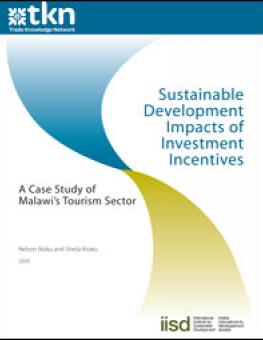
Sustainable Development Impacts of Investment Incentives: A Case Study of Malawi's Tourism Sector
Many countries have policies to attract foreign direct investment (FDI) and use policy instruments such as investment incentives to enable FDI relationships. While the efficacy of incentives as a determinant for FDI is often questioned, small developing countries have resorted to such measures. Malawi, for instance, has introduced a range of allowances, tax holidays and tax rate reductions for investors in its tourism sector. This case study investigates the costs and benefits of these incentives, especially in light of assisting the country in reaching its sustainable development goals.
Key findings:
-
Through an analysis of the top ten imports qualifying for general and tourism specific incentives it is clear that these incentives are in conflict with the basic tenets of sustainable and environmental development and there is evidence of missed of policy targets.
-
Bureaucracy at Malawi Revenue Authority, the implementing agency, hampers uptake and utilization of the current incentives. For example, the process of following-up waivers was a long and expensive process and, at times, not worth the incentive.
-
Investment incentives do not determine FDI in the tourism sector; rather, decisions to invest were largely driven by the country's natural resources, the cost of raw materials, the availability of relatively cheap labour, and inflation, foreign exchange and interest rates.
-
Eighty per cent of tourism-sector investors interviewed would have established themselves in Malawi even if there were no investment incentives. The nature of their business establishment was also not influenced by the incentives package.
-
Some important areas needing policy reorientation or refocusing are: consultation with local communities in the planning process, forging partnerships with the private sector, liberal immigration regulations to facilitate free tourist movement and a tourism infrastructure development policy to facilitate tourism development for the benefit of both tourism and the wider society.
Key recommendations:
-
A policy is needed to identify ways in which the benefits from tourism activity can be spread more evenly throughout society.
-
Specific FDI should be achieved by formulating a focused set of investment incentives that target a specific activity/set of operators. Such a policy must be clear, measurable and specific.
-
To counter the bureaucratic challenges faced by investors, the government should simplify the process of applying for and granting waivers to reduce the time and money spent on the process by investors.
You might also be interested in
Sustainable Asset Valuation of Sherwan Hill Adventure Park in Abbottabad, Pakistan
This report analyzes the social, economic, and environmental benefits of the Sherwan Hill Adventure Park in Pakistan.
December 2024 | Carbon Minefields Oil and Gas Exploration Monitor
In November 2024, 23 oil and gas exploration licences were awarded across five countries, with Russia granting the licences that account for the largest portion of embodied emissions.
Toward a Coherent, Transformative Approach to Financing Sustainable Development, Climate, and Nature
Four key proposals for the Fourth Financing for Development Conference (FfD4) to create an integrated, equitable approach to financing climate, nature, and development goals.
Green Public Procurement in India
This report analyzes the status of green public procurement (GPP) in India and suggests key strategies for advancing sustainable procurement practices.